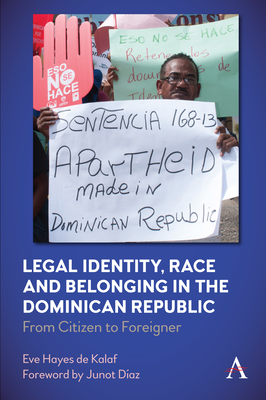Legal Identity, Race and Belonging in the Dominican Republic: From Citizen to Foreigner

Legal Identity, Race and Belonging in the Dominican Republic: From Citizen to Foreigner
Over the next decade, states will be carrying out large-scale registrations in alignment with the Sustainable Development Goals (SDGs) which aim to provide more than one billion people around the world with evidentiary proof of their legal and, increasingly, digital existence. 'Legal Identity, Race and Belonging: From Citizen to Foreigner' is an important book which identifies a connection between the role of international actors, such as the World Bank and the United Nations, in promulgating the universal provision of legal identity and links these with arbitrary measures to restrict access to citizenship paperwork from (largely) Haitian-descended people born and living in the Dominican Republic. The book provides the definitive analysis of the events leading up to the controversial 2013 Constitutional Tribunal ruling that rendered the Dominican plaintiff Juliana Deguis Pierre stateless. Hayes de Kalaf illustrates how measures that purposely blocked people of Haitian ancestry from accessing their legal identity not only affected undocumented and stateless populations - persons living at the fringes of citizenship - but also had a major impact on documented people; Dominicans already in possession of a state-issued birth certificate, national identity card and/or passport. The book illustrates the complex and contradictory ways in which digital identity systems are experienced, thus challenging the assumption within current development policy that the provision of ID to everyone, everywhere will lead to the inclusion of all citizens.
PRP: 264.95 Lei
Acesta este Prețul Recomandat de Producător. Prețul de vânzare al produsului este afișat mai jos.
238.46Lei
238.46Lei
264.95 LeiIndisponibil
Descrierea produsului
Over the next decade, states will be carrying out large-scale registrations in alignment with the Sustainable Development Goals (SDGs) which aim to provide more than one billion people around the world with evidentiary proof of their legal and, increasingly, digital existence. 'Legal Identity, Race and Belonging: From Citizen to Foreigner' is an important book which identifies a connection between the role of international actors, such as the World Bank and the United Nations, in promulgating the universal provision of legal identity and links these with arbitrary measures to restrict access to citizenship paperwork from (largely) Haitian-descended people born and living in the Dominican Republic. The book provides the definitive analysis of the events leading up to the controversial 2013 Constitutional Tribunal ruling that rendered the Dominican plaintiff Juliana Deguis Pierre stateless. Hayes de Kalaf illustrates how measures that purposely blocked people of Haitian ancestry from accessing their legal identity not only affected undocumented and stateless populations - persons living at the fringes of citizenship - but also had a major impact on documented people; Dominicans already in possession of a state-issued birth certificate, national identity card and/or passport. The book illustrates the complex and contradictory ways in which digital identity systems are experienced, thus challenging the assumption within current development policy that the provision of ID to everyone, everywhere will lead to the inclusion of all citizens.
Detaliile produsului











